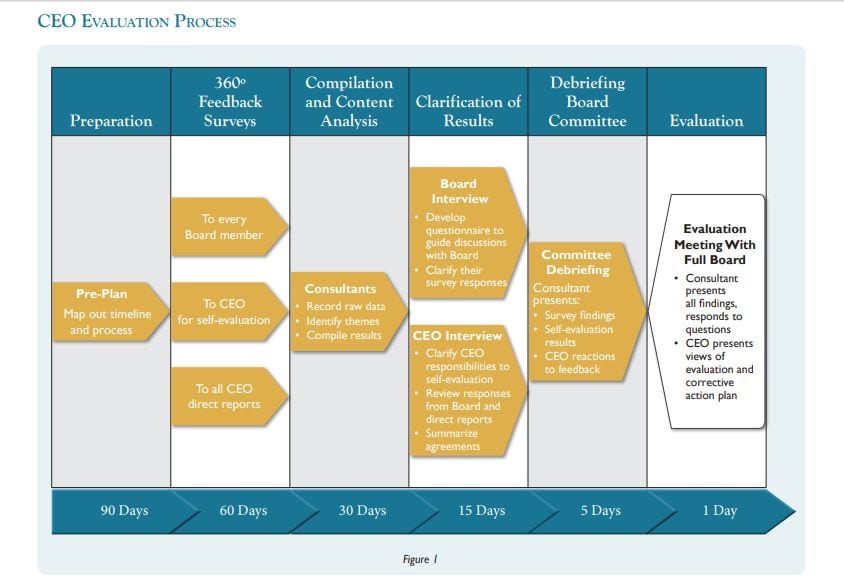This article explains the problems with traditional CEO performance evaluation, and lays out benefits and a process for doing it effectively.
The Problem with CEO Performance Evaluation
Too often, assessment of CEO performance is limited to judgments regarding the previous year’s financial achievements or disappointments. While this is important, it’s only part of the story; and such a limited view tends to dwell too much on the past, where little can be done to change things.
Benefits of CEO Evaluation Done Right
In reality, a CEO’s evaluation should relate to the organization’s future. A good process clarifies the organization’s direction, gives it momentum, and advances the leader’s development.
By depending less on an “in-house” process and relying more on an independent evaluation specialist, the Board can take a giant step toward a positive, forward-thinking assessment plan of action. An outside consultant broadens the scope of the evaluation and helps the Board by:
- Putting in place an effective evaluation structure
- Providing clear, objective information
- Promoting open communication among all parties
- Enhancing the relationship between the Board and CEO
CEO Performance Evaluation – An Effective Process

As Figure 1 illustrates, the Consultant provides an efficient structure to facilitate the CEO performance evaluation. This includes:
- pre-planning
- feedback surveys
- analysis of data
- a series of interim meetings to clarify and communicate results
- and, finally, the formal evaluation meeting with the Board and CEO.
By the time the final meeting takes place, the performance critique has been completed; areas of agreement and disagreement have been identified; and the CEO has developed an action plan to address questions regarding both organizational performance and personal development. These actions maximize the productivity of the final evaluation meeting. But the structure offers other benefits beyond efficiency:
Timetable Implementation
From the very beginning, as part of the planning stage, the Consultant, the Board, and the CEO agree on a timeline.
CEO Acceptance
An experienced Consultant makes certain that the CEO understands how the process works, providing detailed feedback throughout the process and ensuring a level of comfort and agreement every step of the way.
Red-Flag Warnings
The clear performance targets established during evaluation provide a schedule of measurable benchmarks throughout the year. When the organization’s pace falls short of these benchmarks, there may still be time to revise plans or counteract the problem with appropriate action.
Pathway to Other Board Responsibilities
This CEO evaluation process provides direction for compensation, succession planning, future CEO evaluations, and other essential CEO/Board obligations.
Gathering the Right Information
Decisions with sweeping influence on an organization should not be based upon information gleaned solely from in-house financial figures, the CEO’s self-evaluation, or other internally generated statistics. A truly effective evaluation process consists of objective and reliable data that is best supplied by an outside specialist. The Consultant enriches the information available to the directors in several ways.
More Clarity, Less Ambiguity
How many directors think identically about their CEO’s performance? Do all Board members feel the same about the organization’s goals? Probably not. The Consultant gathers data and opens up discussions in a way that captures the diverse views of all participants, thereby clarifying both opinions about the CEO’s performance and the Board’s performance expectations.
More Comprehensive Information
The Consultant systematically gathers information about the CEO from a variety of sources. The core of this process is the 360º feedback survey, developed after sufficient input from the Board and CEO. It contains a series of questions that cover financial objectives, non-financial objectives, and leadership effectiveness. Each question contains opportunities for both quantitative responses (typically a numerical rating) and additional qualitative information (a space to express their thoughts or justify a rating).
These surveys are sent to the CEO for a self-evaluation, and to every Board member. Surveys containing only the non-financial and leadership effectiveness components are distributed to each of the CEO’s direct reports, providing the Board with the rare opportunity to learn how direct reports, as a group, feel about the job their boss is doing.
Objective Analysis
Providing accurate and valid information is the overriding concern of Consultants. Their objective experience with other organizations enables them to identify significant ideas and themes that emerge from the information they collect. A clear, concise report provides the directors and the CEO with valuable, unbiased information that may not be obtained otherwise.
Communication with the CEO and Board
To be of greatest value to the organization, CEO performance evaluation should be a collaborative, consensus-building experience. So, the Consultant’s goal is to encourage frank and open communication with all participants, creating a positive climate.
Building CEO Receptivity
Success is directly influenced by the CEO’s acceptance of the evaluation process. It is quite natural for the CEO to feel defensive or anxious. From the beginning, it is the Consultant’s job to minimize those feelings by helping the CEO clearly understand what will happen, when it will happen, and that the outcome will enhance professional growth and effectiveness. Such an approach makes the CEO comfortable — even encouraged and optimistic about the process.
Protecting Confidentiality
Under no circumstances will a Consultant compromise a CEO, Board member, or the organization by revealing the source of a particular remark. When compiling comments from feedback surveys, for example, the Consultant looks for recurring themes or issues, and then captures their meaning with representative remarks that conceal the original source(s).
Meetings, whether with committee or individual, are conducted with the same resolute consideration for privacy. This leads to greater candor on the part of all participants, making the information produced uncommonly precise and honest. When the Board and CEO find themselves in delicate discussions that can potentially become confrontational, the Consultant’s skill to facilitate such encounters by defusing sensitive issues keeps the conversation on track.
Benefits of CEO Evaluation
Without the evaluation process, how would the CEO know what the Board wants?
Simply posing this question makes the spirit and power of evaluation immediately apparent. The objective is not merely to measure the CEO’s performance. An effective evaluation process doesn’t just spell out specific performance targets for the coming year; it produces a dialogue about the organization’s short-term goals and long-term direction that forges a genuine working partnership between the Board and the CEO.
By going through the process, the CEO receives explicit insight regarding personal strengths and critical improvement areas. Though the Board measures the CEO’s performance, the CEO develops an action plan to address those developmental needs and organizational expectations. Evaluation becomes a reward for the CEO by providing an unambiguous path toward greater effectiveness and professional accomplishment.
Finally, the process becomes a part of the organization’s culture. The annual review of performance, establishment of mutually approved performance targets, and development of an effective action plan provide the means to measure performance during next year’s evaluation. As a result, the plan and the process are in place to carry the organization toward the successful outcomes that both the Board and CEO envision.
More Information
To further explore implementing a CEO evaluation process in your organization, please contact us.
You might also enjoy these articles:
Leadership Evaluation: Four Key Factors to Measure Performance
5 Reasons You Need A Succession Plan
Download This CEO Evaluation Whitepaper
Fill out the info below, then key your eyes on your inbox for your own copy of our CEO Evaluation whitepaper.













